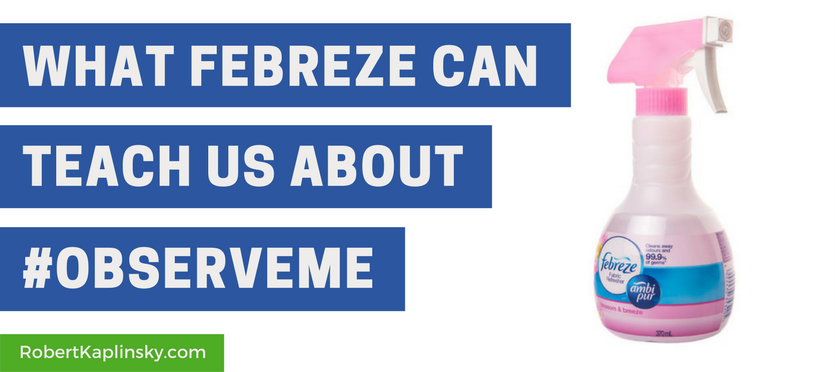One of my favorite takeaways from the book The Power of Habit: Why We Do What We Do in Life and Business was the origin story of the odor removing spray: Febreze.
He begins by sharing how it was accidentally created by a chain-smoking Proctor & Gamble scientist. The day that scientist discovered it, he went home only to have his wife think he was cheating on her. The reason was that he didn’t smell like cigarette smoke so she thought he had changed his shirt and had something to hide. The reality was that the liquid he had worked on had splashed on his shirt and removed the order!
Soon, the Proctor & Gamble marketers started product trials and interviewed a park ranger who frequently caught skunks and explained that Febreze had changed her life. She said that while it wasn’t hard for her to get dates, the relationships never lasted because everything in her life smelled like skunks: her clothes, her hair, her car, her home, everything. She broke down in tears as she realized that she could do what she loved and now have a relationship too.
The marketers realized in that moment that this product was going to make them millions of dollars… except that it didn’t. While people liked how it removed odors, no one really used it. Towers of products in beautiful displays remained untouched. They didn’t know why or what to do about it.
So, the marketers continued to interview people in an effort to better understand what was happening. The breakthrough moment happened when they interviewed a woman who had many, many cats in her home. Her whole house reeked of cats, and you could smell it before you entered her home. The house was clean, but the stench made a researcher gag. They asked her what she did about the smell. She said it wasn’t usually a problem. So they asked how often she noticed it. She said about once a month. The researchers looked at each other, then asked her if she smelled it now. She said no.
The same thing happened at many other places they visited. People had become so accustomed to the smell that they no longer noticed it. They had become desensitized. The people who needed Febreze the most were often the least able to realize it.
Think about it. Right now your home probably smells the way it always does. So while this may be good or bad to someone else, there is no trigger for you to realize that you need to use Febreze.
Here’s the scary part: the same thing is happening in education right now.
For many teachers, what’s happening in their classrooms is what always happens in their classrooms. It may be good or it may be bad, but it is what it always is. Basically, it smells the way it always smells. And, if you aren’t going into other classrooms to see what they are doing or if other educators aren’t going into your classroom to see what you are doing, then you have no idea if your classroom smells great or if you need some Febreze.
That is why I love #ObserveMe so much. It gives me much better perspective on my own practices in terms of where I can improve and what I can learn from others. I also use the Febreze metaphor heavily in my IGNITE! talk on #ObserveMe.
What do you think? How do you express the importance of opening classrooms to others? Please let me know in the comments.


Reminds me, in a way, of the Five Monkeys “Experiment” with justification of decisions because “that’s just how it has always been done.” With ObserveME we get new glimpses into creative ways to do something, maybe that I have always done, but with a fresh strategy or setup or hook or whatever it might be. It’s amazing what we can learn when we take down walls and pay attention to what’s happening around us.
I’ll also say, it IS in fact totally different to hear someone tell you about something cool they did versus SEEING them do it.
http://workingoutloud.com/blog/the-five-monkeys-experiment-with-a-new-lesson
Wow Mark. I had not heard that story in a long time and completely forgot about it. Thanks for the link. I see the connection you’re making. Sometimes we do something that way because that’s what society tells us to do. Sort of like status quo bias too. I’ll have to think more about that.